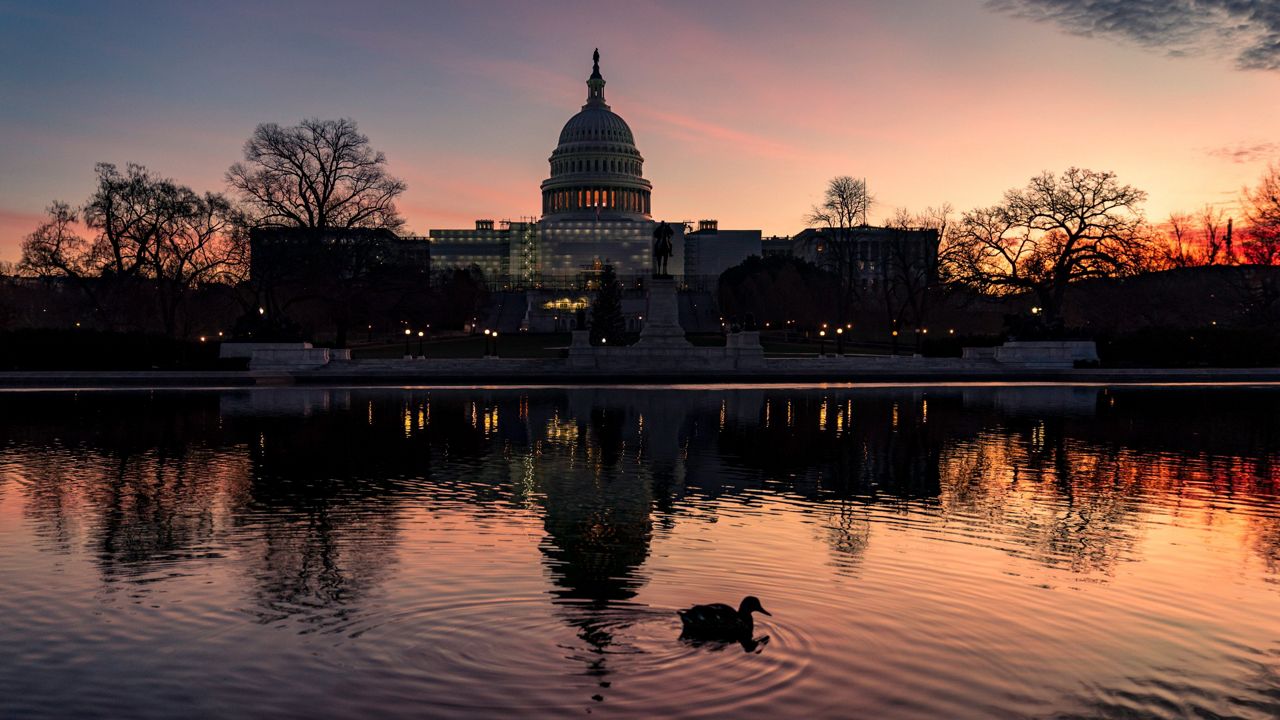Lawmakers leading the negotiations on a bill to fund the federal government for the current fiscal year announced late Tuesday they've reached agreement on a "framework" that should allow them to complete work on the bill over the next week and avoid a government shutdown.
What You Need To Know
- Lawmakers leading the negotiations on a bill to fund the federal government for the current fiscal year say they've reached agreement on a "framework" that should allow them to complete work on the bill over the next week and avoid a government shutdown
- Congress faces a midnight Friday deadline to pass a spending bill to prevent a partial government shutdown
- The two chambers are expected this week to pass a short-term measure to keep the government running until Dec. 23, which should give negotiators time to complete work on the full-year spending bill
Senate Majority Leader Chuck Schumer, D-N.Y., called the agreement "welcome and important news."
"Congress now has a roadmap for funding the government before the conclusion of the 117th Congress, something the majority, the large majority of us, want to see," Schumer said on the Senate floor on Wednesday.
Speaking to reporters earlier Wednesday, Senate Republican Leader Mitch McConnell, R-Ky., said that he was "glad" to hear that lawmakers came to an agreement on a funding measure, suggesting that the bill will be set on a glide path to passage – but warned that the framework "does not mean the hard work is over," citing the shortened calendar for Congress to get this done.
"The calendar will still make this a challenging sprint," McConnell said, warning that they have a "deadline" of Dec. 22 to enact the bill.
"Our side has made it clear the Senate has until Dec. 22 to complete either a full-year funding bill or short-term [Continuing Resolution]," McConnell said. "That's the deadline and those are the two options."
"It will take seriousness and good faith on both sides to produce actual legislation that follows the framework" before the deadline, the Kentucky Republican said.
Congress faces a midnight Friday deadline to pass a spending bill to prevent a partial government shutdown. The two chambers are expected to pass another short-term measure before then to keep the government running through Dec. 23, which will allow negotiators time to complete work on the full-year bill.
"Now, the House and Senate Appropriations Committees will work around the clock to negotiate the details of final 2023 spending bills that can be supported by the House and Senate and receive President Biden's signature," said Rep. Rosa DeLauro of Connecticut, the Democratic chair of the House Appropriations Committee.
Earlier in the day, Senate leaders said lawmakers from the two parties were nearing an agreement, but Republicans warned Democrats that lawmakers would need to complete their work by Dec. 22 or they would only support a short-term extension into early next year. That would give House Republicans more leverage over what's in the legislation, since they will be in the majority then.
"We intend to be on the road going home on the 23rd. We intend not to be back here between Christmas and New Year's, and if we can't meet that deadline, we would be happy to pass a short-term (resolution) into early next year," said Sen. Mitch McConnell of Kentucky, the Republican leader in the Senate.
McConnell voiced confidence Republicans would be able to meet their priorities of increasing spending on defense without "having to pay a bonus above what President Biden asked for" on non-defense priorities. He said Democrats were willing to accept that because they had previously passed two bills on a party-line basis that allow for more government spending on various domestic priorities.
Sen. Richard Shelby, R-Ala., said last week that the two parties were about $25 billion apart in what is expected to be about a $1.65 trillion package, not including mandatory spending on programs such as Social Security and Medicare. However, Democrats in their statements did not indicate what topline spending number had been reached in the framework announced Tuesday.
At a press conference Wednesday, House Republican leader Kevin McCarthy railed against the deal, saying it should not have been agreed to with the GOP set to retake the House in January.
"We’ve got two members leading appropriations in the Senate who will no longer be here or be able to be held accountable to constituents," McCarthy said, referencing retiring Sens. Shelby and Patrick Leahy, D-Vt., before calling on lawmakers to take up a funding bill next year.
"Allow the American people what they said a month ago, to change Washington as we know it today," McCarthy said. "We can't afford to continue to spend the way the Democrats have. The future generation cannot afford it as well."
When asked by Spectrum News whether House Republicans were cut out of the negotiations with their Senate counterparts and Democrats in both chambers, McCarthy demurred.
“I'm saying it's more than just the Republicans in the House," McCarthy said. "Can you tell me what the baseline they agreed to?”
“I don't think it's just us being cut out, I think the American public's been cut out," he continued. "And if two people who are deciding it aren't going to be held up to the voters, do you feel good about that as an American?"
“I don't think anybody in America would feel good about it," he continued, before blaming Democrats for "runaway inflation" and rampant spending.
"Why would you feel comfortable moving forward?" McCarthy concluded. "I don't think this is a partisan issue. I think this is about saving the country.”



